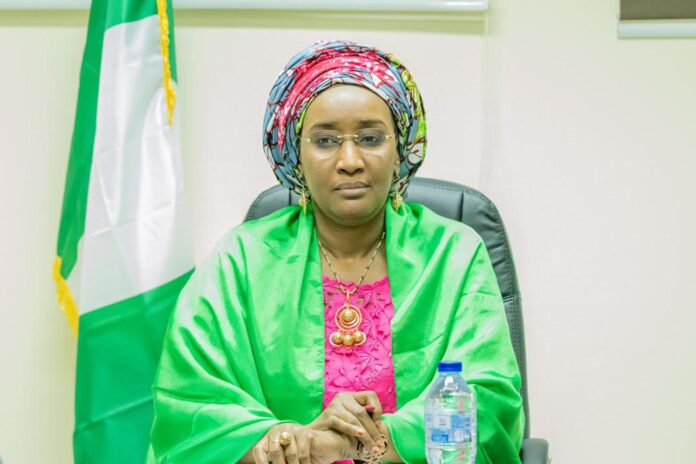Probe school feeding during lockdown
The federal government says it has spent N523.3m to feed pupils during the COVID-19 lockdown. This was recently revealed by the Minister of Humanitarian Affairs, Disaster Management and Social Development (MHADMASD), Hajiya Sadiya Umar-Farouk during the Presidential Task Force briefing on COVID-19 in Abuja. School feeding programme gulps over N500m during lockdown – Minister Parents […]

The Minister of Humanitarian affairs, Disaster Management and Social Development, Hajiya Sadiya Umar Farouq
The federal government says it has spent N523.3m to feed pupils during the COVID-19 lockdown.
This was recently revealed by the Minister of Humanitarian Affairs, Disaster Management and Social Development (MHADMASD), Hajiya Sadiya Umar-Farouk during the Presidential Task Force briefing on COVID-19 in Abuja.
- School feeding programme gulps over N500m during lockdown – Minister
- Parents pick holes in FG’s School Feeding programme
She explained that the clarification became necessary following widespread criticism and speculations around the Home Grown School Feeding Programme (HGSFP) of the federal government.
“It is critical at this juncture to provide details that will help puncture the tissue of lies being peddled in the public space,” the minister said. She explained that the provision of ‘Take Home Rations’, under the modified HGSFP, was not a sole initiative of the MHADMASD but a presidential directive, which the ministry was obeying.
According to her, the ministry went into consultations with state governments through the State Governors’ Forum following which it was resolved that ‘take-home rations’ remained the most viable option for feeding children during the lockdown.
“So, it was a joint resolution of the ministry and state governments to give out take-home rations”, she affirmed.
Umar-Farouk said according to statistics from the Nigeria Bureau of Statistics and the Central Bank of Nigeria, a typical household in Nigeria has five to six members, with three to four dependents. She said “each household is assumed to have three children.
The minister recalled that long before the HGSFP was domiciled in the ministry, every child on the programme received a meal a day.
“The meal costs N70 per child. When you take 20 school days per month, it means a child eats food worth N1, 400 per month.
Three children would then eat food worth N4, 200 per month and that was how we arrived at the cost of the take-home ration.
Figures given by the minister show that a total of 124,589 households were impacted in the country between May 14 and July 6, 2020.
Thus, “If 124,589 households received take-home rations valued at N4, 200, the amount will be N523, 273, 800,” the minister explained.
She said the agreement was for the federal government to provide the funds while the states will implement the programme.
To make the process transparent and give it credibility, Umar-Farouk said the ministry collaborated with the World Food Programme as technical partners, while TrackaNG monitored and gave daily updates validating the programme.
Since this programme was launched in May 2020 by Umar-Farouk at the central primary school Kuje in the FCT, it has continued to come under severe criticisms.
Even after defending government action at the 32nd joint national briefing of the Presidential Task Force (PTF) on COVID-19, many Nigerians yet felt modifying the school feeding programme to take place in pupils’ homes amounts to a misplaced priority, a departure from initial goal, and a waste of huge public resources.
Although the Minister claimed it was modified to cushion the effect of lockdown on households, the modified arrangement precluded parents whose children are not in public schools or not in any school at all.
The verification process which was opaque as well as the distribution pattern of items that was open to pilfering and corruption were other shortcomings of the programme.
The minister’s assertion that the modified HGSFP was a presidential directive isn’t an excuse for the flaws associated with it.
In spite of the huge resources spent on the programme, many children in the country remained malnourished.
The acclaimed ‘impact’ of the modified HGSFP has remained indiscernible.
The fact that the World Food Programme and TrackaNG were technical partners in the implementation process did not make the programme impeccable.
If the HGSFP was strategically meant to increase school enrolment, how was the modified HGSFP going to achieve this when the entire country was locked down to contain COVID-19?
There are insinuations that the MHADMASD has so much resources that are begging for utilization.
Although Umar-Farouk claims anti-graft agencies were involved in the implementation of the programme; yet, we call on relevant arms of government to institute an independent probe into this gratuitous school feeding programme.
